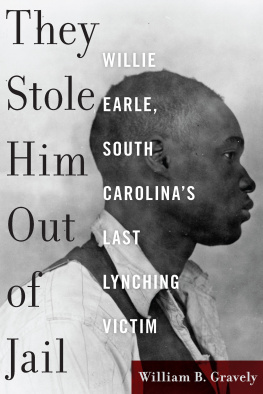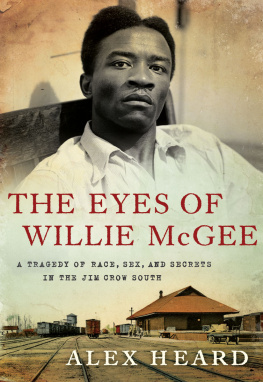William Gravely - They Stole Him Out of Jail: Willie Earle, South Carolina’s Last Lynching Victim
Here you can read online William Gravely - They Stole Him Out of Jail: Willie Earle, South Carolina’s Last Lynching Victim full text of the book (entire story) in english for free. Download pdf and epub, get meaning, cover and reviews about this ebook. year: 2019, publisher: University of South Carolina Press, genre: Non-fiction / History. Description of the work, (preface) as well as reviews are available. Best literature library LitArk.com created for fans of good reading and offers a wide selection of genres:
Romance novel
Science fiction
Adventure
Detective
Science
History
Home and family
Prose
Art
Politics
Computer
Non-fiction
Religion
Business
Children
Humor
Choose a favorite category and find really read worthwhile books. Enjoy immersion in the world of imagination, feel the emotions of the characters or learn something new for yourself, make an fascinating discovery.
- Book:They Stole Him Out of Jail: Willie Earle, South Carolina’s Last Lynching Victim
- Author:
- Publisher:University of South Carolina Press
- Genre:
- Year:2019
- Rating:3 / 5
- Favourites:Add to favourites
- Your mark:
- 60
- 1
- 2
- 3
- 4
- 5
They Stole Him Out of Jail: Willie Earle, South Carolina’s Last Lynching Victim: summary, description and annotation
We offer to read an annotation, description, summary or preface (depends on what the author of the book "They Stole Him Out of Jail: Willie Earle, South Carolina’s Last Lynching Victim" wrote himself). If you haven't found the necessary information about the book — write in the comments, we will try to find it.
William Gravely: author's other books
Who wrote They Stole Him Out of Jail: Willie Earle, South Carolina’s Last Lynching Victim? Find out the surname, the name of the author of the book and a list of all author's works by series.
They Stole Him Out of Jail: Willie Earle, South Carolina’s Last Lynching Victim — read online for free the complete book (whole text) full work
Below is the text of the book, divided by pages. System saving the place of the last page read, allows you to conveniently read the book "They Stole Him Out of Jail: Willie Earle, South Carolina’s Last Lynching Victim" online for free, without having to search again every time where you left off. Put a bookmark, and you can go to the page where you finished reading at any time.
Font size:
Interval:
Bookmark:

They Stole Him Out of Jail
THEY STOLE HIM OUT OF JAIL
Willie Earle, South Carolinas Last Lynching Victim
William B. Gravely

Publication of this book is made possible in part by
the support of the South Caroliniana Library with the
Assistance of the Caroline McKissick Dial Publication Fund.
2019 University of South Carolina
Published by the University of South Carolina Press
Columbia, South Carolina 29208
www.sc.edu/uscpress
28 27 26 25 24 23 22 21 20 19
10 9 8 7 6 5 4 3 2
Library of Congress Cataloging-in-Publication Data
can be found at http://catalog.loc.gov/
ISBN 978-1-61117-937-8 (hardback)
ISBN 978-1-61117-938-5 (ebook)
Front cover photograph: Willie Earle,
Greenville City Police photographs, 1946
Authors royalties for this edition go to the
South Caroliniana Library and to the descendants of
Thomas Watson Brown and Willie Earle for care of their graves.
This book is dedicated to the memory of the victims from 1947, Thomas Watson Brown and Willie Earle, and their families and friends.
And to Hawley B. Lynn for his courageous antilynching witness and to those who supported his effort to condemn the abduction of Earle as contrary to the values of Pickens.
And for support by my immediate family: brother Don, sister-in-laws Anna Maree and Mary, and in memory of eldest brother, Alvin.
And to the memory of my father, Marvin, who in his ninth year, with the lynching of Brooks Gordon, had a similar experience to mine, and in memory of my mother, Artie Hughes Gravely, one of Mrs. Tillys WSCS women working for Christian social responsibility.
And to the memory of cousin Mary McKinney Ware for her love and benevolence.
And to the memory of Beatrice Holliday, who taught me beyond treating others as we would like to be treated, to treat others as they would like to be treated, telling me as a child after I said, You are my Aunt Jemima woman, never to call her that and went on caring for me.
And in honor of daughter Julie, son-in-law Craig, with Matt, Ernesto, Lynn, and Michele and families, and of Carol, Mian, Sue, and Margaret for sharing the ups and downs of my life.
And above all to my wife, upstate native and English teacher with a wicked pencil, Mary Liles, who in 1988 had me tell her Pickens High classes this story, fed us during the Guggenheim project, and let me fall in love with her and eventually risked marrying me.
And remembering the Latin motto of the Gravely lineage from England, which translates, I am concerned for the future to those who will shape it: a mighty special grandson, Alex, Kates Claire and Juliet, Karen (first female Gravely graduate from Wofford College), Elise in California, and others yet unborn.
CONTENTS
ILLUSTRATIONS
PREFACE
On Valentines Day 1947 Robert T. Ashmore, solicitor for South Carolinas 13th Circuit, did not arrive early enough to hear the 7:00 A.M. whistle from Poinsett Lumber Company. It awakened the county-seat town of Pickens to begin the work day and blew again to end it. From his office twenty miles away in Greenvilles Courthouse, he came that Friday to meet Sheriff Waymon Mauldin and attorneys with their clients. With criminal court to convene on Monday, he wanted to reduce the case load where possible. In office since 1936, the solicitor had recently resumed his duties after military service. When Ashmore came back to Pickens on Monday, he would face the biggest challenge of his career.
Both county-seat communities placed courthouses close to jails. Greenville had separate city and county facilities. While there was also a stockade to house chain-gang prisoners, Pickens city authorities used the county jail in town. Down the hill from the Pickens Courthouse, it resembled a miniature castle with a tower. It would play a prominent role at the end of the weekend when an unexpected abduction occurred there. That trauma transformed Ashmores plans, not only for the next week but for the next three months. When he returned on Monday, a lynching had occurred out of the jail just before daybreak. The solicitor would assume major responsibility in its investigation, which would lead to a jury trial in May.
The victim was a twenty-four-year-old black man who boarded and worked in Greenville but who grew up around Liberty, seven miles away. Eighteen hours before a mob took him from the jail, Pickens officers found Willie Earle socializing with friends near the Beverly rock quarry outside Liberty. A local cabdriver delivered the parties there, but Earles arrest broke up the festivities. It was a Sunday, and deputies found him too drunk to be questioned. He did insist that he had not attacked a Greenville Yellow Cab driver late Saturday night near the Pickens road.
That casualty, Thomas Watson Brown, was a Georgia native who had served in World War I. He formerly worked in a Greenville textile mill. A local farmer found him groaning and bleeding on the ground some distance away from his taxi. Authorities rushed Brown to Greenvilles St. Francis Hospital. Only brief accounts in Mondays morning newspapers mentioned what happened Saturday night, until testimony came at the coroners inquest for Brown. He died before noon on February 17, the same day as the lynching.
Saturdays sequence of events started when Brown picked up Earle at the corner of Markley and Calhoun Streets in Greenville. He was already intoxicated. The exact time of the fare is unclear, as was a question of whether another rider joined Earle. When he got to his widowed mothers house in Liberty, he told her he came by bus. On Sunday morning, however, an investigation of the crime scene around Browns cab led to tracks from large shoes with new heels. They could be followed from there to Tessie Earles house not far from the middle of Liberty. There investigators claimed to find the shoes, the probable weapon, and a jacket that had been washed of stains. Mrs. Earle later contested their allegations.
In Greenville on Sunday, Browns coworkers and family monitored his condition. By evening it was clear that the forty-eight-year-old would not live much longer. Some fellow drivers talked about ways to take out their rage over his fate. The Liberty taxi man, from whose cab officers had arrested Earle, drove over to join them. He added his anger to the mix and affirmed that Browns suspected attacker was in the Pickens jail. His brother-in-law was its keeper.
Conversations within and among six cab companies sparked recruitment for those willing to go abduct Earle in Pickens. An initial gathering place to select who would go and whose taxis would be used was the Yellow Cab office adjoined to the parking garage behind the Poinsett Hotel. It was in midtown across a one-way alley from the county courthouse. The Sheriffs Department was on that buildings ground floor. Those who joined the mob divided into groups to fill at least eight taxis. Independent from them, a local businessman drove his car to Pickens. The gang agreed to meet after 4:00 A.M. at a tavern and tourist camp on the Saluda River dividing Pickens and Greenville Counties. One taxi blew a tire at the edge of Pickens.
At the Pickens jail about half the group remained in the yard while the others gathered on the porch. Two carried shotguns. The jailer allowed some to enter. He apparently did not assert his authority to defend Earle but did order the men not to curse. In the cellblock where the suspect had been sleeping, a few drivers pulled Earle from his bed and down the stairs. They threw him into the lead taxi. In it a key leader held a shotgun. On the return trip to Greenville, the caravan divided up to prevent their being followed. A second flat tire hampered another taxi and motor problems crippled a third. Near their prior launching spot inside the Greenville County line, a temporary stop enabled the abductors to interrogate Earle. They alleged later that he admitted stabbing Brown after they scuffled. Earle had received a blow to the head.
Next pageFont size:
Interval:
Bookmark:
Similar books «They Stole Him Out of Jail: Willie Earle, South Carolina’s Last Lynching Victim»
Look at similar books to They Stole Him Out of Jail: Willie Earle, South Carolina’s Last Lynching Victim. We have selected literature similar in name and meaning in the hope of providing readers with more options to find new, interesting, not yet read works.
Discussion, reviews of the book They Stole Him Out of Jail: Willie Earle, South Carolina’s Last Lynching Victim and just readers' own opinions. Leave your comments, write what you think about the work, its meaning or the main characters. Specify what exactly you liked and what you didn't like, and why you think so.










